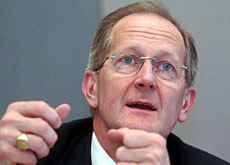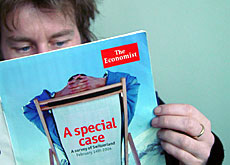Faint applause for economic plan

The Swiss government has launched a 17-point plan to kick-start the economy – without spending any public money.
Swiss business leaders said it was a step in the right direction, but trade unions dismissed the plan as nothing more than a public relations exercise.
The main political parties gave only a lukewarm response to the latest attempt to boost growth in Switzerland.
Over the past decade the Swiss economy has grown more slowly than in any other country in the Organisation for Economic Cooperation and Development (OECD).
Earlier this month the economics ministry forecast modest growth of 1.8 per cent in 2004.
The government plan involves increasing competition in the Swiss domestic market and opening the labour market to foreign workers.
The government also wants to ensure that education is better suited to the needs of the labour market, as well as reforming certain welfare benefits such as invalidity pensions.
Easier said than done
All these will be priorities over the next three years, the government says, but achieving results may not be so easy.
Increasing competition in the Swiss domestic market would help to lower prices, increase consumer spending and boost the economy.
But it also means weakening Switzerland’s traditionally strong cartels. The government has wanted to do this for years but has faced resistance from the business sector.
Ministers also want to open Switzerland’s labour market to new European Union member countries.
This move is not popular with some of the more conservative political parties, who fear Switzerland may be flooded with economic migrants from eastern Europe.
Finally, any tampering with Switzerland’s welfare system is likely to be resisted by the Left.
Disappointment
The 17-point plan received a less than enthusiastic reaction from Switzerland’s major political parties.
The centre-left Social Democrats said they were disappointed, describing it as a “hotchpotch” of minor measures and amendments which had little to do with boosting economic growth.
And the rightwing Swiss People’s Party said the plan was long on “noble intentions” but short on real substance.
The centre-right Radicals accused the government of simply rehashing suggestions already made two years ago, adding that the policy on agricultural reform required clarification.
Right direction
The Swiss Business Federation, economiesuisse, said the plan was at least a step in the right direction. But a spokesman for the federation said business leaders had expected firmer commitments and more binding suggestions from the government.
The Swiss Federation of Trade Unions dismissed the plan as a public relations exercise, saying it contained suggestions which had already been discussed many times.
The reactions will be a disappointment for the economics minister, Joseph Deiss. He has repeatedly said that boosting the economy is a top priority for both government and parliament over the next few years.
But at least his own party, the centre-right Christian Democrats, supported him, describing the 17-point plan as a sign that Switzerland’s high prices were finally being tackled.
swissinfo with agencies
Switzerland has had the slowest growth among OECD member countries for the last ten years.
Switzerland also has some of the highest prices in Europe.
The government predicts growth of 1.8% for the coming year.
Growth among European Union member countries is expected to be over 2%.

In compliance with the JTI standards
More: SWI swissinfo.ch certified by the Journalism Trust Initiative



You can find an overview of ongoing debates with our journalists here . Please join us!
If you want to start a conversation about a topic raised in this article or want to report factual errors, email us at english@swissinfo.ch.